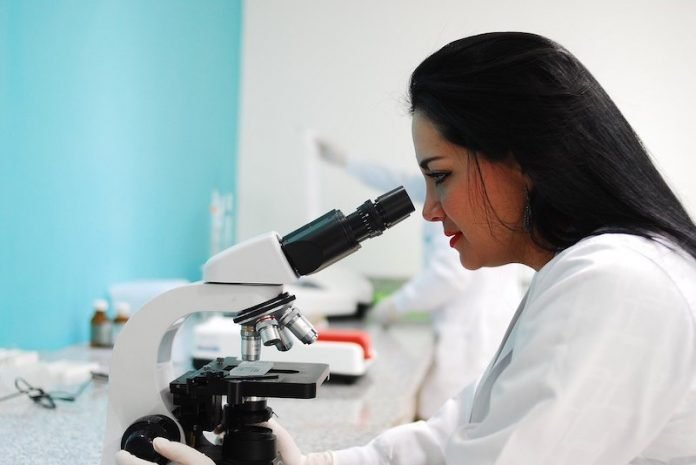
In a new study, researchers suggest that cancers are often heavily reliant on breaking down fats for their growth and spread, and could be treated by a highly innovative combination of new drugs and dietary changes.
They used a surgical ‘iKnife’ to analyze vaporized cancer tissue—and identified a metabolic weakness in cancer that could be amenable to a new metabolic treatment.
They found that targeting cancer’s ability to process fat using a new class of drugs could halt tumor growth in mice, but only when combined with a diet free of fats.
The findings open up the possibility of ‘drugs and diet’ cancer treatments—combining precision medicine and dietary changes.
But the researchers stress that the proposed dietary changes would only apply in combination with a specific new class of drugs—and that they are not suggesting they would have any benefit in any other clinical context.
The research also showed the potential for the iKnife to instantly pick out tumors with the metabolic weakness during surgery by analyzing the smoke given off as tissue is burned during excisions.
The research was led by scientists at The Institute of Cancer Research and elsewhere.
In the study, the team looked at cancer cells in the lab and patient-derived tumors to search for ‘metabolic fingerprints’ – chemical patterns left behind by the inner workings of cells.
They used an analytical function connected to the iKnife, which cuts through tissue by rapidly heating it, to sift through the smoke from vaporized tissue for crucial clues about cellular metabolism.
They found that a molecule called PI3K—which is vital to the growth and survival of cancer cells—has a key role in triggering the release of arachidonic acid, a key omega-6 fat.
PI3K is often mutated in many cancers, including breast, gynecological and bowel cancers.
The researchers found that the mutant form of PI3K sets in motion a chain of events involving another key molecule, cPLA2, which releases arachidonic acid. That in turn fuels the uncontrolled growth and spread of cancer.
The team then showed in studies in mice that a new class of drugs called cPLA2 inhibitors—which are in clinical trials for the treatment of various inflammatory conditions—could be adapted to treat fat-reliant cancers.
But the drugs only worked when combined with dietary changes to restrict the consumption of fat.
The researchers believe that targeting cPLA2 is only effective when there are no dietary sources of arachidonic acid or some other fats to fuel cancer.
In other words, a fat-free, plant-based diet is necessary for these drugs to be effective.
The findings only apply to the use of these experimental cPLA2 inhibitors.
They do not imply that the presence of fat could interfere with any existing cancer drugs, nor that the dietary fat restriction alone halts tumor growth.
The team says iKnife technology can detect whether tissue is cancerous within seconds during surgery, but this is the first study where it has been used to track the biology of the tumors.
It raises the prospect that the iKnife could in future be used during surgery to detect tumors with a heavy reliance on fat, so patients could receive metabolic treatment.
One author of the study is Dr. George Poulogiannis, Leader of the Signalling and Cancer Metabolism Team.
The study is published in Cell.
Copyright © 2020 Knowridge Science Report. All rights reserved.



